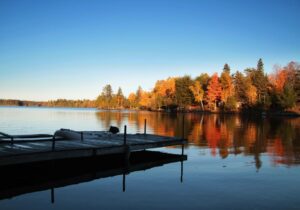
Fall is here (sigh) which for many means it’s time to prepare to close up the cottage until next spring. Preparing your cottage for winter can seem daunting and there are some critical tasks you don’t want to forget, but with a little planning, closing can go smoothly.
Here are some tips to help you prepare your cottage for winter:
Inspect Everything
Take some time at the end of the summer to inspect your cottage and assess any damage that might have happened over the summer to things like the roof, chimney, the foundation, or eaves troughs. Doing this a little earlier on will allow you to address problems now rather than risk more damage over the winter and spring.
Plumbing and Septic
- Inspect your septic system. If your system is due for an inspection or pump out, call in a professional to make sure it’s functioning properly before you close up to avoid any surprises in the spring.
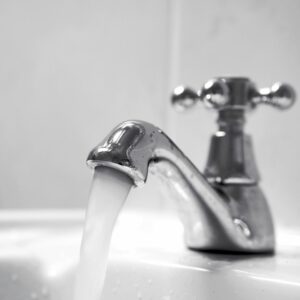
- Turn off your water supply and drain your pipes and blow out any excess water to prevent them from expanding and cracking over the winter. Don’t forget washing machine, dishwasher and garden hoses!
- disconnect the water pump first and prepare it according to the manufacturers instructions
- if you have a water heater, disconnect the intake and use a hose to drain any remaining water from the heater
- drain the rest of the lines in your system by opening all the taps and flushing the toilet until the tank is empty.
- Add non-toxic antifreeze to all vulnerable pipes, sinks, showers and toilets
Roof
- Inspect your roof and replace any broken or missing shingles and repair damaged seals
- Trim back any overhanging branches that may be brought down by ice
- Clean your gutters so rain and melting snow can flow freely (this is also good protection from wildfires too!)
- If you have a fireplace, clean it out at the end of the season and close the damper vent
Power and Batteries
- Unplug major appliances and turn off individual breakers before flipping the main switch to off
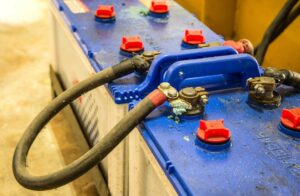 this will help protect your major appliances, including your pump and hot water tank when you power up in the spring
this will help protect your major appliances, including your pump and hot water tank when you power up in the spring
- Store all extension cords in rodent-proof containers or take them home where they won’t be subject to freezing temperatures
- Disconnect propane tanks and store them somewhere safe
- Give your batteries a cleanup to remove grease and dirt
- Make sure batteries are fully charged before storage
- a fully charged battery can withstand freezing down to about -60°C
- for lead-acid batteries, top up the acid reservoir with distilled or deionized water before charging to allow them to receive a full charge
Furnaces, Fireplaces and Woodstoves
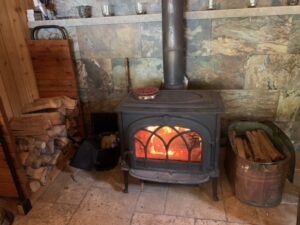 If you have a furnace, turn the heating down or off
If you have a furnace, turn the heating down or off
- consider setting the thermostat to around 10°C to prevent frost build-up
- if you plan to turn the furnace off entirely, make sure to properly prepare your pipes to prevent freezing and be sure to turn the gas off
- Clean out all debris and ashes from the bottom of woodburning stoves and fireplaces
- Clean and check glass windows for cracks
- Check the damper to ensure soot and debris is removed and close the damper vent
- Pack up and remove loose paper products, old rags, chemicals, and other items that could easily catch or spread fire
- Ensure there’s a supply of wood and kindling on hand ready to go in the spring!
Pest Mitigation
- Stop up any openings small animals may be able to squeeze through and use a chimney cap or cover to stop unwanted visitors from getting in
- Pack up all food (even dry and canned goods) and take it home with you
- Make sure BBQs are cleaned and stored
- Seal up mattresses, bedding and other soft furniture to discourage nesting (including a few sheets of fabric softener inside will help discourage mice as well)
Cottage Life has a some additional reminders in this video:
Removing your Boat
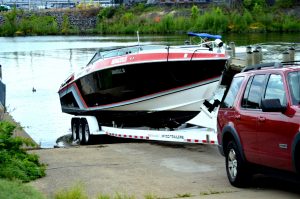
In 2022, rules came into effect in Ontario requiring boat owners to take reasonable precautions to remove all aquatic plants, animals and algae from any boat, boat equipment, vehicle or trailer before transporting a boat or boating equipment overland.
When getting ready to retrieve your boat this year, remember Clean, Drain and Dry to help keep invasives in check.
Cottage Life also has a great article on how to prep your boat engines for winter here.
Security
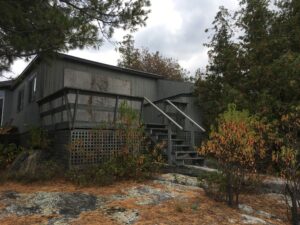 Check that everything is locked
Check that everything is locked- Keep all curtains closed
- Ensure your boat(s), paddle boards, kayaks, water toys and patio furniture are stored in a dry place, out of sight and protected from the elements
- Remove all valuables at the end of the season
- Take photos of everything in case any damage happens to the property during the winter
- this will making the reporting process smoother if you need to file an insurance claim
Make sure you check your seasonal property insurance policy or talk to your broker, as your insurance company may require you to take other precautions, such as checking in on your property at certain time intervals or installing a monitored alarm system. If possible it’s a good idea to check up on the property throughout the winter. If you can’t make the trip, ask a neighbour who may be up during the colder months to check for ice or clear any snow. Some cottage communities also have winter patrols that you can join in on!
Additional Resources to Help you Winter Safely
- Clean, Drain and Dry Your Boat Before Leaving the Lake
- Be Bearwise as Bears Prepare for Winter
- Cold Water Awareness
- No Ice is Safe Ice
- Winter Driving Tips
- Assembling a Winter Survival Kit for your Vehicle
- Wood Stove Safety Tips
- Important Safety Considerations for Bubblers
- Snowmobiling
